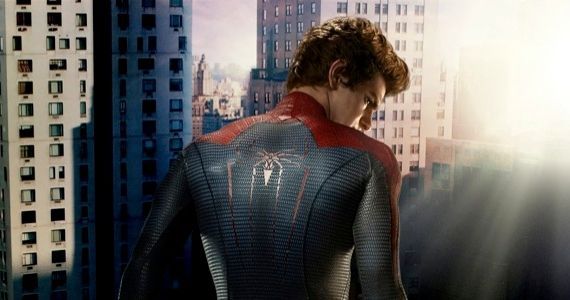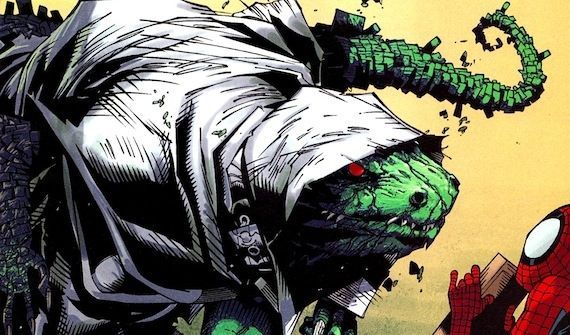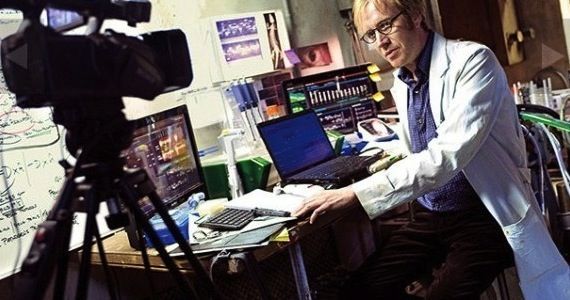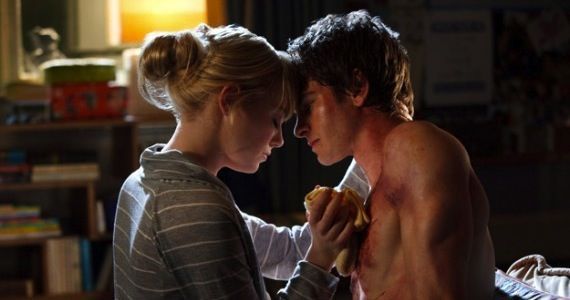Director Marc Webb, Emma Stone (Gwyn Stacy) and producer Matt Tolmach made their way to WonderCon today to give attendees a sneak peak at some of the footage from the upcoming The Amazing Spider-Man and field questions from Spidey devotees. We had the opportunity to sit down with Webb exclusively to talk about fan expectation, the design and thematic relevancy of the Lizard and what defines this film as the "untold story" of Spider-Man.
Screen Rant: There's been a great deal of discussion about the tone of the film. Do you feel as though a general audience may respond more quickly to what feels (from what we have seen) to be a more naturalistic, grounded approach whereas some more established fans of the character may be initially resistant?
Marc Webb: "I think when you talk about tone it means a lot of different things to a lot of different people. I think that if you make something that's relatable then people will attach themselves to it. You can express it in a lot of different ways but I feel like as long as you are consistent and fair with the audience they’ll engage irrespective of how they self-identify. I think it just gets too complicated to track all those differences between demographics."
SR: Well certainly fans of the comics will be paying attention to aspects of the depiction that many audience members will not. If you look at the villain, that’s sort of a key issue that people talk about: 'He has the coat he doesn’t have the coat. His nose is flat, it isn’t flat.' So bearing all that in mind, how did you approach the design of the Lizard?
MW: "Something you can do in a comic that you can’t do in a film is that you can have thought bubbles. So it was really important for us to be able to express the emotion and the humanity within that Lizard. And I wanted Rhys’s performance to come through with that and that was an important part of creating and designing the villain in this case."
SR: How does that play into his transition from Dr. Curt Connors into the Lizard? How do you work with the animators to make sure that that’s coming through and matching what Rhys had created?
MW: "We did a lot of performance-capture. We had Rhys perform so that you could get the nuance of the facial movement. There is an incredible amount of work that goes into creating a performance that feels somewhat emotionally authentic and it was really important to us for that to come from Rhys. So we sat down with Rhys and a variety of departments and we would shoot him doing the scenes. I mean the scale is a little different than he is, than human scale, but we thought it was really important that it come from a human place."
SR: How much was in place in terms of the story before you came on board?
MW: "We basically started from scratch."
SR: Were you the one to select the Lizard as the central villain and what inspired that choice?
MW: "I'd always been a fan of the Lizard. In the world that were creating, I feel like the Lizard embodies, literally, one of the more important themes of the movie which is that we all have a missing piece. Right? Curt Connors is missing his arm, Peter is missing his parents and how you choose to fill that void is how you define yourself. And they make different pathways that become more apparent as the movie progresses but that was one of the things that I thought was particularly symmetrical about that villain. And the other thing is that he's Peter's friend in a way. Which gives Peter another set of problems he has to overcome. You can't just kill the villain without some sort of emotional consequence."
SR: When you first sat down to craft the story did they send you to Marvel University where they locked you in a room with all of the Ultimate Spider-Man issues and all that came before?
MW: "I went back and looked at a few of them. But the truth is that I wasn't thinking of this as a comic-book movie. I was just thinking of it as a movie about a kid who goes out looking for his father and finds himself. And obviously there are some spectacular things that you want to see through Spider-Man's eyes in the universe that we're creating. But at the end of the day it's a story about a kid who lost his parents and the sort of emotional consequence that being a hero brings."
SR: One of the challenges for me as a female audience member (in general terms) is that the female characters sometimes become appendages with not much happening in their own right. Did you address that at all in this film?
MW: "Sure, there's this damsel in distress trope that is very convenient when you have a male protagonist. It's an easy narrative tool. But I think that something that happens in Spider-Man is that there are a lot of powerful, strong women. Whether it's Aunt May or Gwen Stacy. That's one of the things I really liked about Gwen Stacy. One of the great things about Emma Stone is that she is incredibly smart and very confident. Another thing about Gwen Stacy is that she's a scientist. There's a joke in the movie about her being first in her class and she's actually a little bit smarter than Peter. Which I think is a really fun thing to play. I mean Emma is, she would recoil if she heard me say this, but she is a comedic genius. She is so funny."
SR: She had the best moment in the show at the Oscars.
MW: (Looks furtively around and smiles) "I know...And to see her go toe-to-toe with Andrew when we screen tested her she was just dynamite. And in terms of female characters, I think that Spider-Man has a lot to play there."
SR: Clearly the biggest part of the marketing campaign thus far has been the idea that this is "the untold story." The film (as a reboot) necessarily has to be an origin story, so, knowing that had been done, how did you land on an approach that would also count it as an untold story?"
MW: "Well there are a few things that hadn't been explored cinematically. First there is the Lizard obviously. But there's also what happened to Peter Parker's parents. Which I think is a really significant building block to who he is. There is a huge impact when someone looses their parents when they are seven or eight. There is a real significant emotional consequence, that's a blow. There's also of course the Gwen Stacy saga. But I remember in 'The Amazing Spider-Man #8' there's an attitude to it...Peter and Flash have a boxing match. Peter really has a chip on his shoulder, he's sort of like fed up with Flash and there's that surly attitude that can become kind of trickstery and really funny when he's in the suit. And I really liked that. I think that's really connected to who he is and there's all those elements that combine to create the story that we've never heard."
SR: Where are you in the post-production process?
MW: "Visual effects. I just came from working on the visual effects."
SR: How difficult is it to manage the balance of being in that phase of the film, talking to press and an audience with this level of interest to promote it (while it is still incomplete) and talking about things like script revisions for the next one and thinking in the broader context of the universe as a whole?"
MW: "We haven't really gotten deep into the next movie yet. It's just, you become consumed. And in a way it's easier not to shut your brain off. It's a lot of work but it's also really exhilarating. I mean, it's a dream come true. Are you kidding me? It's amazing."
SR: At this stage in this process, after coming from 500 Days of Summer what has been the most surreal aspect of this experience?
MW: "I think the general curiosity and how many people are aware of the project as you're making it, whereas '500 Days of Summer' was totally off the radar. There's the real sense of responsibility you have to the people who hold that character dear. I mean it's really important to people. I find that moving but it's also a lot of pressure. I mean you have to be respectful of the iconography of Spider-Man but also bring something new. And give something of yourself that's specific in you in order to make it worthwhile to make. So the thrilling part is the scope of the awareness...and getting to meet Stan Lee is pretty great too."
SR: Would you like to stay in this world of the big blockbuster event films or work on smaller character pieces?
MW: "I think people often think that there's an exchange between the two, like there's a spectrum. Audiences can tell when you're being fake and they will eat you alive. But if you're doing something authentic they will connect to it and that can lead to commercial success. I don't think about the size of it, I think about the story. There's a certain muscle in terms of what you can accomplish and what you can build in terms of scope which is really appealing, really fun, and really addictive. But ultimately it's the story."
The Amazing Spider-Man swings into theaters on July 3rd, 2012.
Follow me on twitter @jrothc




